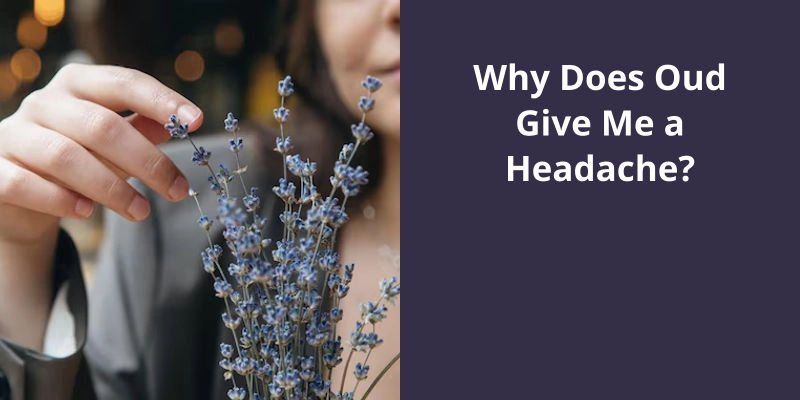Oud, a heavy, woodsy scent, may cause headaches due to its potent intensity. Some individuals have a sensitivity or allergy to strong scents, which can trigger a headache. Your body’s reaction to oud can manifest as a headache if it finds the scent overpowering or irritating. Additionally, the compounds in oud, like other perfumes, can interact with your nervous system and cause certain reactions such as headaches. Finally, some people’s bodies process certain scent notes differently, and in some cases, this processing can lead to discomfort or headaches.

What Smells Trigger Headaches?
Headaches are a common ailment that can be triggered by a variety of factors. Among them are smells, which have been shown to be a major contributor to headache pain. Specific odors have been identified as potential triggers, including perfume, cigarette smoke, motor vehicle exhaust, and certain foods and cleaning products. In some cases, these odors may also lead to olfactory hallucinations during a migraine attack, known as OHM.
Perfumes are a major culprit in triggering headaches.
Cigarette smoke is another common odor that can trigger headaches. Additionally, secondhand smoke can be just as harmful as smoking itself, and can still be a potent trigger for headaches, even if the individual isn’t a smoker.
Motor vehicle exhaust is yet another odor that’s known to trigger headaches. Additionally, exposure to exhaust fumes can also lead to respiratory problems, which can exacerbate headache pain.
Some cleaning products are also known to trigger headaches, especially those that contain strong chemicals like bleach or ammonia. These chemicals can be extremely irritating to the eyes and nasal passages, and can cause headaches in some people. Additionally, the fumes from cleaning products can be harmful to the lungs, leading to respiratory problems that can amplify headache pain.
Certain foods, like aged cheeses, cured meats, and red wine, are also known to trigger headaches in some people. These foods contain high levels of a substance called tyramine, which can cause blood vessels to constrict and lead to headaches. Additionally, foods that are high in sodium can cause dehydration, another common cause of headaches.
From perfumes and cigarette smoke to motor vehicle exhaust and cleaning products, it’s important to be aware of potential triggers and avoid them whenever possible. Additionally, understanding the connection between smell and OHM can help individuals better manage their headaches and find relief from pain.
How Can People Prevent and Manage Headaches Triggered by Smells?
Headaches triggered by smells can be prevented and managed by avoiding the triggers, such as strong perfumes and chemical odors. Good ventilation and air filtration systems can also help. In addition, practicing stress-reducing techniques, such as exercise, meditation, and massage, can alleviate headaches. Over-the-counter pain relievers may also be helpful, but it’s important to consult a healthcare professional before using any medication.
It’s no secret that certain scents can trigger headaches and migraines in some individuals. But have you ever wondered which specific perfume notes could be causing your discomfort? For those who suffer from migraines, it’s important to know which fragrances to avoid. In this article, we’ll explore the perfume notes that are commonly associated with headaches and migraines.
Which Perfume Notes Cause Headaches?
Perfumes are intended to enhance personal hygiene and add to the wearers appeal and allure. The bouquet of scents that make up a perfume varies from person to person and often reflects personal tastes and preferences. However, certain perfume notes can cause headaches in some individuals. Migraine sufferers, in particular, are sensitive to certain smells and fragrances which can trigger painful headaches and discomfort. Perfume manufacturers are aware of this phenomenon and typically list the key ingredients of their products on the packaging to enable customers to make informed choices.
Rose is a commonly used scent in perfumes and cosmetic products. Although it’s hailed for it’s sweet and romantic aroma, it can also trigger headaches in people who’re sensitive to smells. The fragrance is extracted from the petals of the rose flower and blended with other essential oils in the perfume-making process. Some individuals don’t react well to the scent, which can cause migraines, stuffy noses, or even skin rashes. Others may experience subtle symptoms like nausea, dizziness, and eye irritation.
Vanillin is another perfume note that can cause headaches. The compound is responsible for the sweet, warm, and comforting aroma of vanilla. It’s commonly used in perfumes, food flavorings, and cosmetic products as a fragrance enhancer. Vanillin perfume notes have been known to trigger asthmatic symptoms in some people, especially when it combines with other volatile compounds in the perfume.
Japanese Cypress, also known as Hinoki, is a popular perfume ingredient, especially in mens fragrances. It’s a woody, fresh, and spicy aroma and is typically used as a base or middle note in perfumes. However, like rose and vanillin, the scent can cause headaches and allergies in some people. It’s important to note that some individuals are more sensitive to certain perfumes than others, and their reactions may vary depending on the strength and formulation of the fragrance.
Other perfume notes that have been known to cause headaches in sensitive individuals include musk, bergamot, lavender, and linalool. It’s important to test your reaction to these scents before purchasing a perfume or cosmetic product that contains them. One way to do this is to apply a small amount to your skin and wait for an hour to see if any allergic reactions occur. If you experience any discomfort, it may be best to avoid using that product.
How to Choose a Perfume Without Causing Headaches
If you’re sensitive to fragrances, here are some tips for selecting a perfume that won’t give you a headache: choose a perfume with a low concentration of fragrance oils, test the scent before purchasing, avoid synthetic fragrances, and opt for natural, essential oil-based perfumes.
Conclusion
In conclusion, the olfactory system is a complex and intricate network that plays a fundamental role in our daily lives. While many of us enjoy the sensory experience of different scents, it’s essential to understand that some fragrances may have unintended consequences, such as causing headaches. It stimulates the trigeminal nerve, leading to inflammation and resultant headaches. Therefore, it’s crucial to be aware of the effects of different scents on our well-being and seek medical attention when necessary. Ultimately, with proper knowledge and awareness, we can enjoy the wonders of fragrances without risking our health and well-being.





